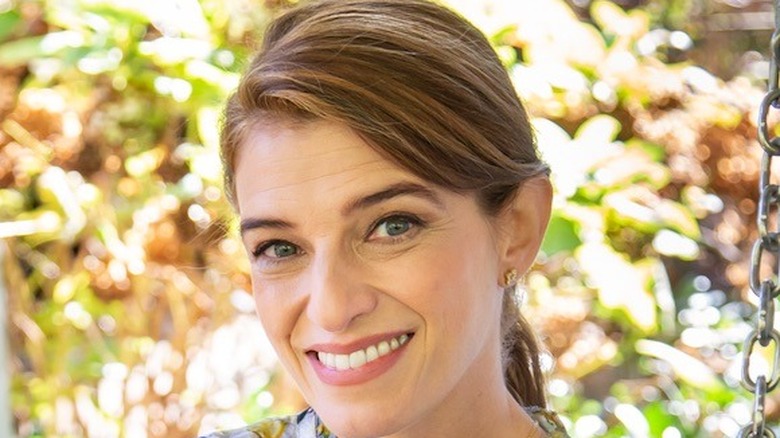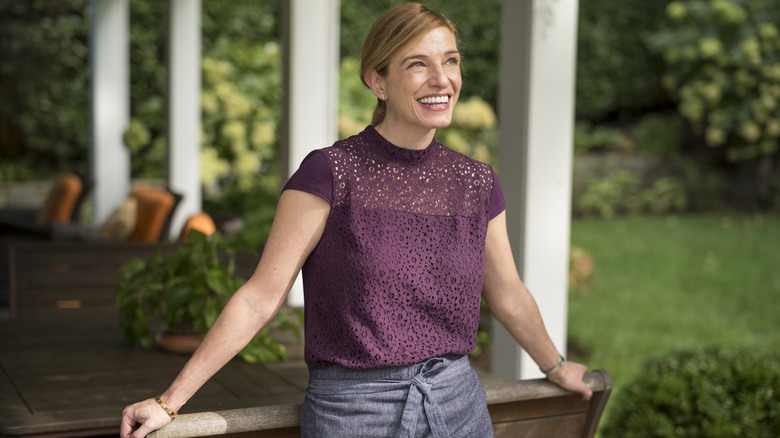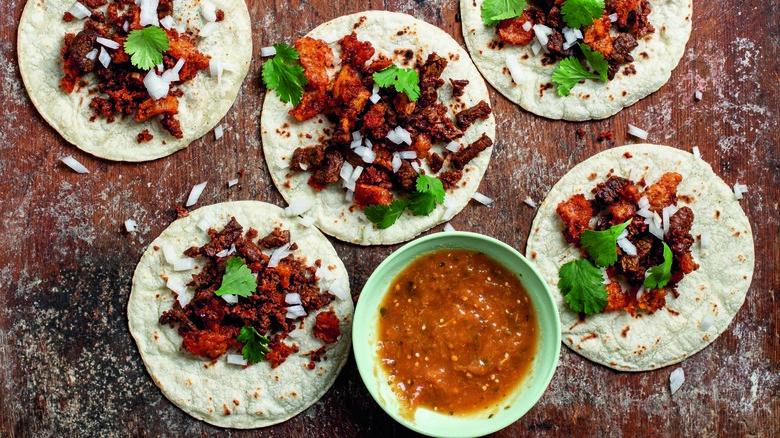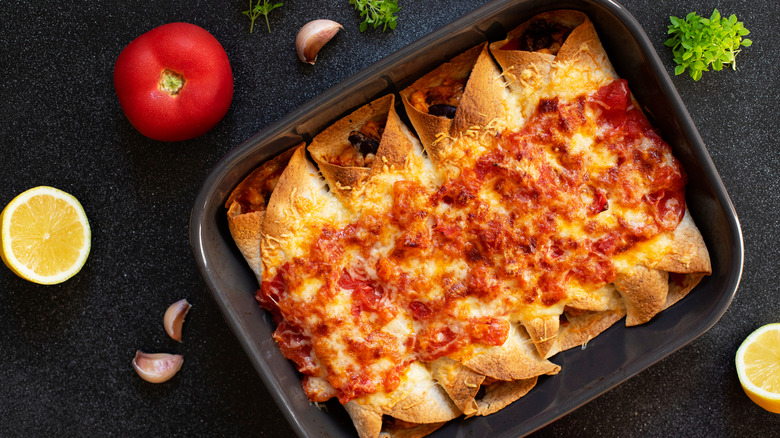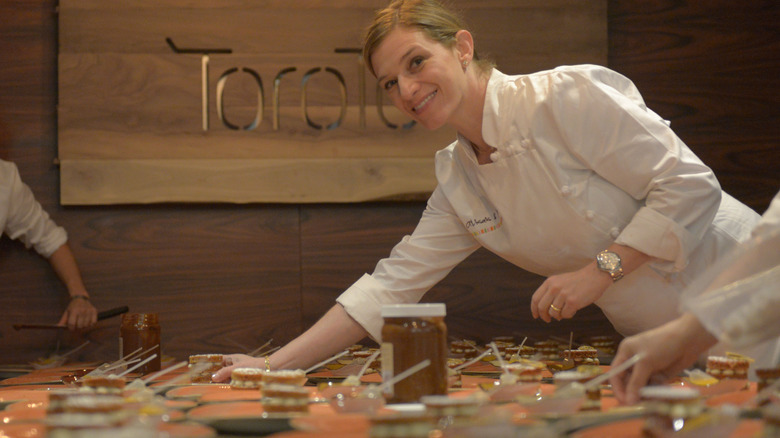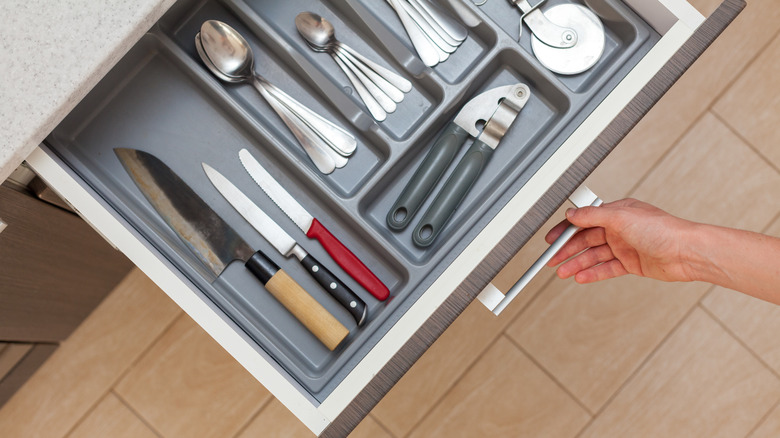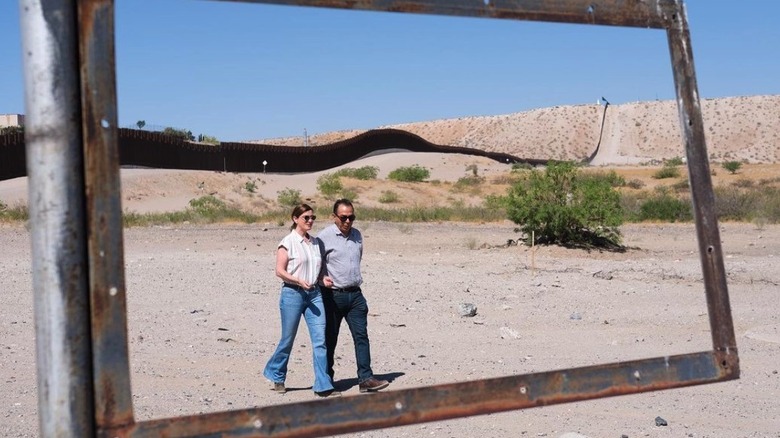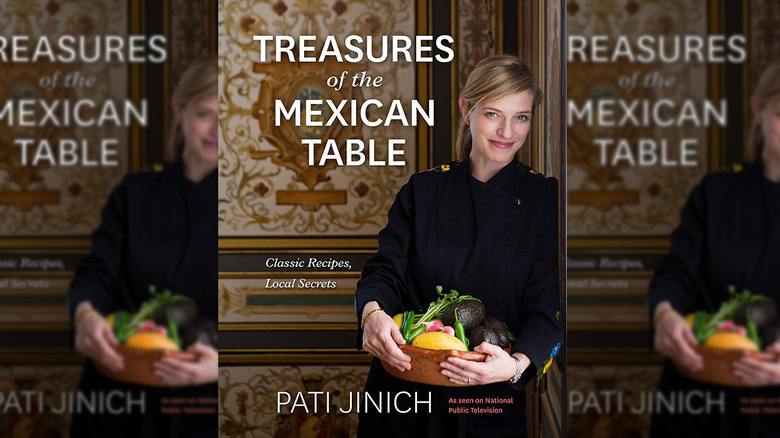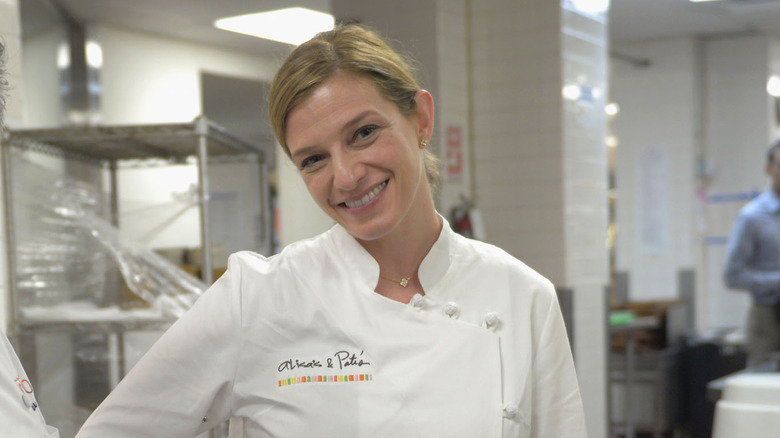Chef Pati Jinich Dishes On Starting Her Career Later In Life And What Mexican Food Means To Her - Exclusive Interview
Chef Pati Jinich has been staple fixture of the American culinary scene for nearly a decade and a half now thanks to her passion for and skill with the foods of her native Mexico. She's had successful TV shows, penned several cookbooks, and has won a prestigious James Beard award. But if you could go back 15 years and ask Jinich what she'd be doing today, her answer may have included politics or academia, but almost surely no mention of cooking. For while food has always played a major role in the chef's life when speaking personally, it was never part of the professional plan. In fact, Pati Jinich was well into a successful career working for a Washington, D.C. think tank — a policy research center called Inter American Dialogue — when two things became clear to her: she was losing interest in her day job and she was, in her own words, thinking "obsessively" about food.
During a recent Mashed interview, Jinich dished on the hard decision to leave a stable career for which she'd worked long and hard in order to follow a dream she just couldn't shake. She also talked about the foods she can't live without, the mistakes amateur chefs tend to make, and of course, she had plenty to say about the cuisine of her beloved homeland of Mexico. Just a fair warning: you might not want to read this article on an empty stomach. Or at least do yourself a favor and have a snack close at hand before you read on.
The love of food started well before the cooking career
Did you grow up cooking from a young age, and who and what were your earliest culinary inspirations?
Well, I grew up obsessing about food from a young age. Eating and cooking was a big deal in my family. And my inspirations were my grandmothers and my mother and my sisters. My three older sisters jumped into cooking very early on professionally. I know food was always a big part of my upbringing. Honestly, I think I was a big, big eater, but I didn't really start cooking until I married my husband and moved to the U.S. It's when I needed to cook for us and I wanted to feel closer to home that I started making Mexican food at home.
When did it become clear that cooking for you could be more than just cooking for your husband, for your family, but actually could be a career?
Well, that was much later on because I trained as a political analyst and I worked in a policy research center in a think tank for a few years. And I had an early mid-life existential crisis of sorts when I realized that what I was doing really, I felt like it wasn't helping anybody or touching anyone's life in a productive way, and it wasn't that fulfilling for me. And I realized that by way of cooking in the kitchen I could connect more with people. I could connect more with who I am and the different pieces of myself being a Mexican in America. And so it wasn't until I turned 34 or 35 that I decided to switch careers and enroll in cooking school. And I wanted to do what I was doing, which was trying to connect to my home country and grow roots here at the same time as building bridges between cultures. [I knew] that I could do it much better by way of food.
So I wanted to do food, but with a strong backbone of research and history and a lot of information, so that whatever I did in the food world with recipes and food had really brought people, not only the recipes, but brought a lot of the information they could use to make the recipes their own and adapt them. So not just share a recipe, but say: "In these recipes, you're going to use these ingredients which come from here, and this is the way they've been used," so that you give people the information of how they can adapt it. But also to bring meaning in terms of the stories that a recipe brings into your kitchen, where those recipes come from, from which land, from which people, which culture, which stories. So I fell in love with that.
Pati Jinich talks about starting a new career in her mid-30s
Many people go to culinary school right out of high school, but you obviously took a later path — what was that like having so much more life experience and, frankly, a few more years on the others with whom you were learning?
Yeah, I've never done things in a normal pathway, I think. Well, it took a long time for me to decide, to resign my work as a policy wonk and jump into the kitchen, because I was kind of panicked. Because I had gone to college. I had gotten a merit scholarship to do a masters. I was already working. I was contributing to our family income. I had two kids already. Then I got pregnant with my third. And so it was like, "Am I going to switch now and go to school again?" And that's not only not making money for family, but that's investing money in something. And I didn't even know if I was going to be good at it. And I always thought that you went in steps, you do the college, then you do the masters and you get the job.
And this was taking me completely out of that path. And I didn't know if all of those years of studying and working would go to waste and starting something new at a much later age. But after really feeling like I needed to have meaning in what I did every day, not leaving my kids to go to work for something where I felt like I wasn't doing anything for me or anybody — I wanted to give them an example of doing something that you believe in, that you have faith in, where you have a mission where you believe in the content. And so I took that leap of faith and jumped and just gave it all I had. And now looking back, I think that coming from a completely different world gave me an edge because I had a strong backbone in research and love of history and telling stories. And I think that really helped my storytelling when I'm sharing recipes and food. And it gave me a different perspective.
So today I think I get as many emails from people asking me for recipes as I do asking me for advice on how they can start their new career or how they can switch careers. And I always tell people, don't feel like you need to go on a linear path. Zig zagging is totally fine. And in fact, it gives you that edge. It gives you the different tools. It makes you more well-rounded and worldly. If you come from one world into another world, you come from a different skill set and perspective that may enrich that new world in a different way.
So for example, I mean, I don't know, for someone who's an architect and decides that they don't want to do that anymore, but they want to go into cooking. Well, they may make the most gorgeous of cakes, because they have that design perspective, that building, the knowledge of how to make something stable and tall and beautiful, just a silly example. But I always advise people to, if they feel like they want to make a change, to take the plunge and not feel like, oh, they will be wasting time or will have wasted time. Because you don't know how those skills are going to help you in these other new places.
Pati Jinich on the wholesomeness of Mexican food
Having spent so much of your life in America, you clearly know there's a lot of misconceptions about Mexican food in this country. So what are the things that you wish people here knew more about authentic Mexican cuisine?
How wholesome it is, how family-oriented it is, how accessible, adaptable, repurposable. I always say that the food of a country tends to have the personality of its people. In Mexico, they're just adaptable, we're easy, we're accessible. We'll work here, we'll work there. Maybe you sleep on the floor, maybe you sleep in a beautiful bed. We're just very adaptable, very accessible, very hospitable. And our food is very much like that.
You can dress up a big plate of enchiladas, or they can be quick tacos. You can make a very festive mole for a wedding or that can be so fancy. So I think people don't know how much there is in Mexican cooking of vegetables, grains, fresh produce. It's really a well-rounded mother cuisine. That of course we have the tacos and of course we have the tamales and the tortas and it's all fabulous, but there's also a lot of soul food, nurturing soups and vegetable dishes and stews. And our food is very easy — people think about Mexican food, many times in terms of how laborious it is, because they're thinking of some of the iconic celebration dishes, the mole, the chiles en nogada, but there's so much of Mexican food that is easy.
The dishes Pati Jinich wants to share with the world
If there was one Mexican dish which you could share with everyone on Earth, what would that dish be?
One Mexican dish that I would share with everyone? Oh, that is so hard!
We can allow two or three dishes if you want to, if that's easier.
Well, I think from my new cookbook, "Treasures of the Mexican Table," which has 150 classic Mexican recipes that I think not many people know about. And they're just as sturdy and reliable as other classic Mexican dishes like guacamole and tinga. I think the dressed up chicken soup is one that I think everybody should know about it's a nurturing feeling, chicken soup with garnishes that you dress up. I would say chicken cheesy enchiladas is a favorite around here. I'm in love with a green bean dish in my book that comes from the Yucatán Peninsula where green beans are cooked in a sweet corn sauce and dressed with a chunky tomato salsa and pumpkin seeds.
Pati Jinich's tips for cooking Mexican food
What tips do you have for chefs who want to improve their cooking of Mexican food at home?
Oh, I say play. Just bring ingredients home. People tend to think about Mexican food as just overly spicy and having chili in everything, but we don't have chili in everything. But we do love our chilies and there are many chilies that are not spicy, but should be treated as condiments or vegetables. So I would invite people to bring dry and fresh chili at home, anchos, [yhelos], chilies de [arable]. And they're really like different fruits. They're that different. One chili is like a banana and another is like a pineapple, they're that different, you just need an open mind I think.
What are a few ingredients that you can't live without?
So I would say bringing in the dried and fresh chilies. And you need to just have like ripe tomatoes and onion and corn tortillas and one kind of bean or another, and just start playing with it, playing with the dishes. Get chipotles in adobo sauce for sure. Ripe avocados from Mexico. We always have them in our kitchen. Because you can do avocado toasts. You can make an avocado taco. And then the avocado is also the perfect ingredient to add to soups, and enchiladas, and salads, and so many things. ... I go for black beans, typically ripe tomatoes, white onion, jalapeños or serranos. I think those are musts. Corn tortillas, and I'm obsessed with eggs. I eat a lot of eggs.
Common mistakes chefs make, according to Pati Jinich
What are a few general tips you have for chefs to improve their cooking, and what are common mistakes you see home chefs make?
I think for most people [it's] jumping to trying a new recipe without reading it first. So I think scan the recipe, take the five minutes to read the recipe. And [something] very important that we learn from the French ... I usually say that the French are fussy, and that we Mexicans are very easy and accommodating in our cooking, but there's one thing, I mean, the French have many wonderful things, but one thing that I find that is essential — is their concept of mise en place.
So before you're going to make any recipe, make sure you have all those ingredients at home. If not, you're halfway through cooking and they say, and now add the Worcestershire sauce, and then you go try to find it. You don't have any at home and the onions are already browned. So make sure that before you make a recipe, you have all those ingredients on the counter and try to prep as much as you can. Have the onions chopped, the tomatoes diced, the cheese shredded, whatever it is, try to have the ingredients as you would need to add them to the recipe before you start cooking.
And then that makes it a much more pleasurable experience. You end up with a much better product in the end and you enjoy your time in the cooking more. So give yourself time to read the recipe and make sure that you have all the ingredients at home and prepped.
Pati Jinich talks cooking on camera
What are some of the challenges of cooking on camera that you don't have to deal with when you're in your own kitchen?
Well, wearing makeup! I tend to not do much makeup, but of course, to be on camera, you have to wear makeup. And I mean, other than that, I think when I'm cooking at home, I can play whatever music I want and I have one of my boys around. The company's beautiful. So I think those are the main differences.
What have been some of your favorite experiences cooking on TV?
Well, opening my home and my kitchen to my audience has been very special because for me being very genuine and transparent is most important when connecting with people. When you're sharing the food and culture from your home and from your home country and you're trying to grow roots in this country you just want to be as honest and transparent. And so inviting people into my home and sharing, not only the recipes that I grew up loving, but that I'm learning as I continue to explore in my space, with my tools, with my family, in my home, I feel like I'm really opening myself up and really letting people in. And the response from people is really beautiful. I mean, we get so many emails from so many people that in return share photos of their kitchen and them cooking my recipes, which are really now theirs.
And it's such a beautiful thing because my recipes weren't even mine to begin with. I was lucky to inherit Mexican cuisine. And then of course you play with new things and you come up with new things, but hopefully those become classics that then other people can own. And I think the biggest, my biggest reward, is when I get those emails from people sharing a photo with their family, or their kids, or grandkids, or spouse, and they're saying, "Look, we made these and we made this spin and this is how we liked it." And it's [a] success, I passed on something that is now yours and it's enriching your life. And now I hope that you will pass it on. So I think that's the most rewarding thing.
Pati Jinich on about her PBS special La Frontera
What inspired the creation of your PBS special "La Frontera," and what do you hope people take away from it?
Oh, it's a project I've been wanting to do for years. Being a Mexican immigrant in the U.S. and continually treading worlds, going back to Mexico, coming back here after so many years, I always felt that pull between staying true to your roots, but wanting to enrich your new country and having the access to these both really rich, incredible worlds. And I felt like the more that I visited the border, the more I felt that present. The communities that live in a space that doesn't exist anywhere else — they have that access to both cultures, countries, languages.
And there are so many possibilities that can only happen there. And it is a region and a people that are so misjudged, narrowly mislabeled all the time, and they are so incredibly resilient and are enriching, not one country, but two at the same time. And I think we have so much to learn from the communities at the border. They rely on each other and they thrive against all odds. And I think we don't give them the credit they deserve. There's so many new things that are happening there and that are brewing there that we can all learn from. How adaptable they are, how resilient they are, how culture and art and food have a wonderful way of expressing themselves there. Because people there are holding onto traditions while really breaking new ground because of being at the border.
So I really wanted to bring the microphone there and rather than come with an agenda, I just wanted to pass on the microphone to people and have them share their stories. And that's why they did. They opened their homes, their families, their stories. And my hope is that people will get to know them as they are. It's just a slice, these two hours. It's a two-hour special that's very special, near and dear to my heart, where I think that people can get a glimpse of the borderlands that you don't see in the media regularly.
How Pati Jinich chose the recipes for her new cookbook
How did you choose which recipes would make it into your new cookbook? And how do you choose those ones that you just have to leave out?
Well, that was very difficult. I wanted to include recipes that were heirlooms and classic recipes that have stood the test of time and that have been passed on. Whether in micro-regions, larger regions — all of Mexico. I wanted to give the best version of those recipes and give people the tools to make them their own while giving them the background for it. But I had to cut [a lot]. I was supposed to give 150 recipes to the publisher and I ended up doing 210, and I thought they were going to be so happy with extra recipes. And they were like, "Nope, we need to cut it to 150." So it was an extra editing that I think benefited the book. But I wanted to include recipes that were really worthwhile making, and recipes that I think can be part of people's weekly or monthly rotations. I wanted to have keepers in there, not waste anybody's time.
Chef Pati Jinich's favorite foods to cook
What is a cuisine beyond Mexican that you love, whether to cook, to eat, or both?
I mean, I think after Mexican, the thing that we make the most at home is Italian. My kids love big bowls of pastas and big baking dishes of lasagna, and risotto, and pizza. And Italian food is just as family-friendly, I think, as [Mexican]. And I think that's our next go-to.
Do you have a single favorite dish to cook?
Oh my gosh. I mean, I guess I love making chilaquiles they're messy and delicious and you can have them for breakfast, lunch, brunch, dinner, midnight snack, whatever. They're salty, messy, delicious. For breakfast, you add an egg on top. For lunch, you can add shredded chicken. For dinner, they can be just with avocado. I mean, they're so versatile.
Who are a few of the other notable chefs who are working today who you admire and who you'd like to work with?
Oh my gosh. There are so many, oh, so many. I love Fany Gerson, who is also in the Mexican food space. I'm a big fan of Dorie Greenspan. I've always admired Jacq Pépin. There's so many Mexican chefs that I admire, Victor [Veda] who is phenomenal. Alex Reese from Oaxaca. I mean, there's just so many people in the food space that are doing such extraordinary work.
Check out chef Pati Jinich's newest cookbook, "Treasures of the Mexican Table," and be sure to catch her special "La Frontera" on PBS.
